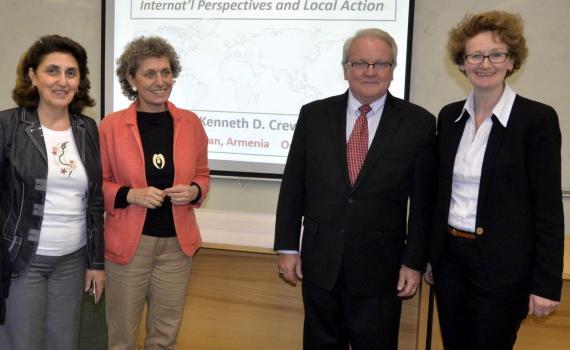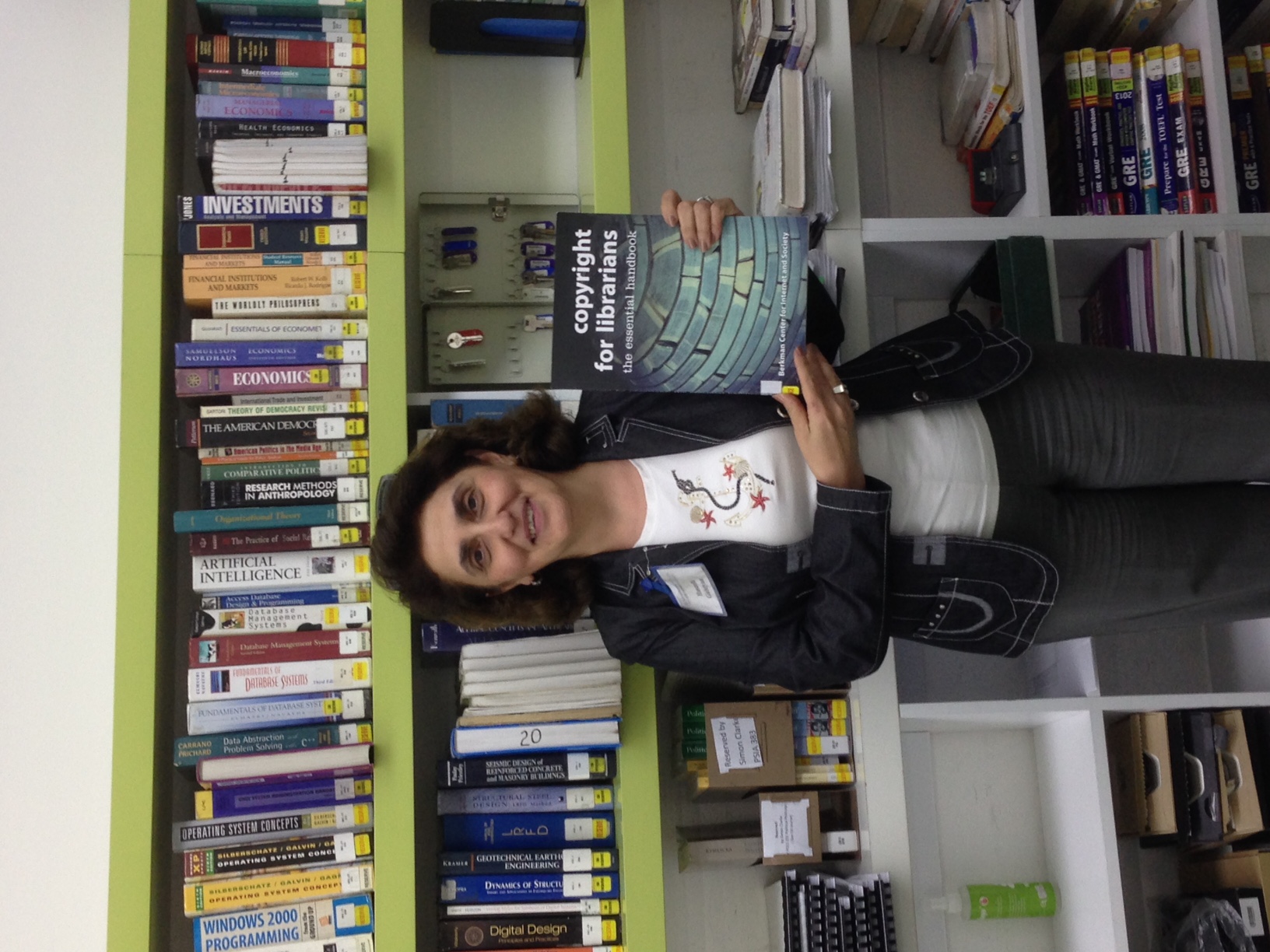
EIFL has been engaged in copyright work in Armenia since 2012 with our partner, the Digital Library Association of Armenia (DLAA). We support advocacy to update the Law on Copyright and Related Rights (2006) for education, research and library activities, such as, the provision of information services to people with disabilities. The draft law on copyright (2017) contains useful new provisions that, if adopted, will support libraries and their work.
We also helped to build capacity of librarians in copyright issues - the Armenian translation of EIFL's Handbook on Copyright and Related Issues (2012) was the first library copyright resource in the Armenian language, and EIFL's Copyright Coordinator has represented library interests at national level (through engagement with the copyright office), and at international level at the World Intellectual Property Organization (WIPO) in Geneva.
“In Armenia, the stakeholder group that showed the most vivid interest was the library community. Our discussions, attended by a wide range of librarians, were very constructive and I learned at first-hand about the specific problems for libraries in Armenia – for a legislator a very precious experience on one hand, and a great challenge on the other. Having heard the voice of the Armenian library community, I changed several provisions in the pre-draft text to meet their concerns as far as possible, especially the chapter on exceptions and limitations, while safeguarding the framework of international and European legislation to which the Republic of Armenia is committed.” - Dr Miha Trampuz, appointed expert to develop a modern and European Union-compliant draft Law on Copyright and Related Rights of the Republic of Armenia (2013).
Background
Armenia joined WIPO and the World Trade Organization (WTO) in 2003. Armenia is party to international treaties including the Berne Convention, Agreement on Trade Related Aspects of Intellectual Property Rights (TRIPS), the WIPO internet treaties and the Marrakesh Treaty for persons with print disabilities. Armenia is also a member of the Eurasian Customs Union (EACU).
In 2013, in the context of negotiations with the European Union (EU) to create a Deep and Comprehensive Free Trade Area (DCFTA), a review of Armenian Law on Copyright and Related Rights (2006) was undertaken to assess alignment with EU laws. (In the end, the DCFTA did not go ahead. Current relations are based on the EU-Armenia Comprehensive and Enhanced Partnership Agreement (2021)).
Libraries in Armenia play an important role in developing a democratic society and in providing support for education and research. They supplement print collections with a range of electronic resources and they offer digital services to library users. However basic activities such as digitization and electronic document delivery are hampered by the copyright law that does not cater for the digital environment. Librarians need to be involved in copyright law reform to ensure that the new law meets the modern information needs of libraries and library users in Armenia today.
Timeline
2012 – ongoing
Main activities and achievements
2012
- EIFL supported an advocacy campaign for copyright reform. The project partners were DLAA (formerly Electronic Library Consortium of Armenia (ELCA)), and the American University of Armenia (AUA). The Project Manager was Hasmik Galystan, EIFL Copyright Coordinator in Armenia. A Library Copyright Committee was established to advise on project activities.
- Dr Maja Bogataj Jančič, Institute of Intellectual Property, Slovenia, was hired to provide a legal analysis of the library provisions in the copyright law with recommendations for amendments.
- As a result of the project, limitations and exceptions (L&Es) for libraries in the pre-draft copyright law were substantially improved, a professional relationship with the Armenian copyright office was developed, and library leadership was strengthened with new knowledge and confidence to debate copyright issues.
- In July 2012, an international library delegation held a roundtable discussion on copyright issues, especially international trends and developments, with senior officials at the Armenian Intellectual Property Agency (AIPA).
- In August 2012, the first meeting to discuss library concerns took place between the Library Copyright Committee and Dr Miha Trampuz, an EU expert appointed to make a pre-draft of the new copyright law.
- In September 2012, a roundtable discussion with 15 library Directors and ELCA members was co-organized with AIPA. There was consensus on the need to address gaps in the law to enable libraries to provide modern, digital services to meet the needs of the academic and user community.
- In October 2012, the first resource on library copyright issued in the Armenian language was published, when the EIFL Handbook on Copyright and Related Issues was translated and adapted for Armenian law. As a result, librarians could learn about the issues and contribute their views.
- In November 2012 copyright officials learnt at first hand the views of librarians around the country. Two seminars, in Lori Regional Library (Vanadzor), and Shirak Regional Library (Gyumri), organized in cooperation with AIPA, were attended by more than 100 participants from libraries, archives and museums, faculty and student councils. Participants had the opportunity to meet copyright officials from Yerevan for the first time, to ask questions and to clarify many issues.
- In November 2012 libraries were invited for the first time to take part in multi-stakeholder events. The VI International Forum of Translators and Publishers, part of Yerevan World Book Capital 2012, and a seminar organized by an EU Twinning Project on Strengthening the Enforcement of Intellectual Property Rights provided an opportunity for librarians to remind participants that stronger copyright enforcement goes hand-in-hand with fair and reasonable user freedoms.
2014
- In December 2014, Hasmik Galystan became the first librarian from Armenia to participate in WIPO's Standing Committee on Copyright and Related Rights (SCCR). During the session, there was an opportunity to meet civil society allies, global copyright experts, and government delegates from all over the world. In a statement delivered on behalf of EIFL, Hasmik made a plea for a global exception for inter-library document supply so that libraries in Armenia and other countries can properly support education and learning.
2015
- In October, EIFL supported a visit to Armenia by renowned international copyright expert, Professor Kenneth D. Crews. At a lecture hosted by the American University of Armenia (AUA), participants discussed issues such as maximizing access to essential textbooks and other educational resources, and the role of copyright as libraries embrace e-resources and universities transform into centres of e-learning.
2017
- In March, EIFL's Copyright Coordinator, Hasmik Galystan, organized a public hearing on the draft copyright law, hosted by the American University of Armenia (AUA).
- In October, EIFL made a return visit to Armenia with Prof Kenneth D. Crews to participate in stakeholder meetings to discuss new provisions in the draft copyright law.
2022 - 2023
- In 2022, Armenia joined the Marrakesh Treaty for persons with print disabilities, and the treaty entered into force in Armenia on September 1, 2022.
- The draft copyright law (2017) includes provisions implementing the Marrakesh Treaty, but the law has not yet been adopted. However, since international treaties in Armenia have direct effect, libraries and people with print disabilities can immediately start using the treaty to create and distribute accessible format copies in Armenia, and with other Marrakesh countries around the world. (Direct effect means that provisions of international agreements ratified by the Republic of Armenia take precedence over national law). See EIFL's Information Note (2023), Can libraries in Armenia use the Marrakesh Treaty? Yes!
Next steps
EIFL and DLAA look forward to the new law that we hope meets the needs of library activities and services in Armenia.
Useful resources
Copyright in Armenia - will library expectations be met?
WIPO should take the lead on libraries before someone else does





